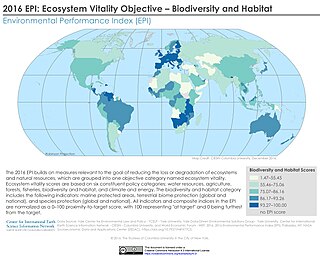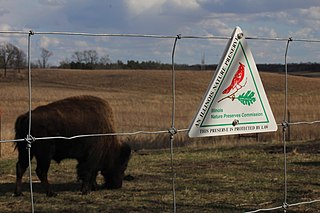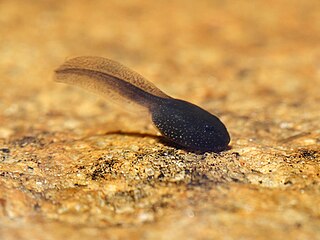
Wildlife refers to undomesticated animal species, but has come to include all organisms that grow or live wild in an area without being introduced by humans. Wildlife was also synonymous to game: those birds and mammals that were hunted for sport. Wildlife can be found in all ecosystems. Deserts, plains, grasslands, woodlands, forests, and other areas including the most developed urban areas, all have distinct forms of wildlife. While the term in popular culture usually refers to animals that are untouched by human factors, most scientists agree that much wildlife is affected by human activities. Some wildlife threaten human safety, health, property and quality of life. However, many wild animals, even the dangerous ones, have value to human beings. This value might be economic, educational, or emotional in nature.

Conservation biology is the study of the conservation of nature and of Earth's biodiversity with the aim of protecting species, their habitats, and ecosystems from excessive rates of extinction and the erosion of biotic interactions. It is an interdisciplinary subject drawing on natural and social sciences, and the practice of natural resource management.

Urban forestry is the care and management of single trees and tree populations in urban settings for the purpose of improving the urban environment. Urban forestry involves both planning and management, including the programming of care and maintenance operations of the urban forest. Urban forestry advocates the role of trees as a critical part of the urban infrastructure. Urban foresters plant and maintain trees, support appropriate tree and forest preservation, conduct research and promote the many benefits trees provide. Urban forestry is practiced by municipal and commercial arborists, municipal and utility foresters, environmental policymakers, city planners, consultants, educators, researchers and community activists.
The voluntary ecological year in Austria and Germany is an educational and orientation year for teenagers and young adults of ages 16 through 27. The voluntary ecological year can be attended only once and usually lasts 12 months.

Ecological restoration, or ecosystem restoration, is the process of assisting the recovery of an ecosystem that has been degraded, damaged, or destroyed. It is distinct from conservation in that it attempts to retroactively repair already damaged ecosystems rather than take preventative measures. Ecological restoration can reverse biodiversity loss, combat climate change, and support local economies.

The Midewin National Tallgrass Prairie (MNTP) is a tallgrass prairie reserve and is preserved as United States National Grassland operated by the United States Forest Service. The first national tallgrass prairie ever designated in the U.S. and the largest conservation site in the Chicago Wilderness region, it is located on the site of the former Joliet Army Ammunition Plant between the towns of Elwood, Manhattan and Wilmington in northeastern Illinois. Since 2015, it has hosted a conservation herd of American bison to study their interaction with prairie restoration and conservation.

The Morton Arboretum, in Lisle, Illinois, United States, is a public garden and outdoor museum with a library, herbarium, and program in tree research including the Center for Tree Science. Its grounds, covering 1,700 acres, include cataloged collections of trees and other living plants, gardens, and restored areas, among which is a restored tallgrass prairie. The living collections include more than 4,100 different plant species. There are more than 200,000 cataloged plants.

Conservation International (CI) is an American nonprofit environmental organization headquartered in Crystal City, Virginia, in Arlington County, Virginia.

Religion and environmentalism is an emerging interdisciplinary subfield in the academic disciplines of religious studies, religious ethics, the sociology of religion, and theology amongst others, with environmentalism and ecological principles as a primary focus.
Mathis Wackernagel is a Swiss-born sustainability advocate. He is President of Global Footprint Network, an international sustainability think tank with offices in Oakland, California, and Geneva, Switzerland. The think-tank is a non-profit that focuses on developing and promoting metrics for sustainability.

The Snow Leopard Trust is the largest and oldest organization working solely to protect the endangered snow leopard and its habitat in 12 countries of Central Asia. The trust is a non-profit organization with its headquarters in Seattle, Washington. The present total population of snow leopards in the wild is estimated at between 3,920 and 6,390.

Harvey Locke is a Canadian conservationist, writer, and photographer. He is a recognized global leader in the field of parks, wilderness, wildlife and large landscape conservation. He is a founder of the Yellowstone to Yukon Conservation Initiative, with the goal to create a continuous corridor for wildlife from Yellowstone National Park in the United States to the Yukon in Northern Canada. In 2017, Locke was appointed chair of the IUCN World Commission on Protected Areas Beyond the Aichi Targets Task Force, with the goal of ensuring the new global conservation targets set at the next Conference of the Parties of the Convention on Biological Diversity in 2020 are meaningful for achieving the conservation of nature and halting of biodiversity loss.
Martha L. "Marty" Crump is a behavioral ecologist in the Department of Biology and the Ecology Center at Utah State University who studies amphibians and reptiles. Crump was the first individual to perform a long-term ecological study on a community of tropical amphibians, and did pioneering work in the classification of variability in amphibian egg size as a function of habitat predictability. She has co-authoried one of the most popular modern herpetology textbooks, Herpetology (1997–2015) as well as the memoir In Search of the Golden Frog (2000) and a number of other books for both adults and children. In 1997, she received the Distinguished Herpetologist Award from The Herpetologists’ League.

Stuart Leonard Pimm is the Doris Duke Chair of Conservation Ecology at Duke University. His early career was as a theoretical ecologist but he now specialises in scientific research of biodiversity and conservation biology.

Chicago Wilderness Alliance is a regional alliance of more than 250 different organizations that work together to improve the quality of life of the individuals and the many other species living in the Chicago (Illinois) area. Through the restoration and sustenation of the biological diversity that once encompassed the lands, their fundamental objective, to preserve the naturally occurring lands and waters in that region, is being made a reality. Through these activities, Chicago Wilderness played a major role in protecting and replenishing the naturally occurring ecosystems in the Chicago area as well as motivating people to become more aware and involved in the preservation of these lands and waters. Chicago Wilderness had continued to blossom through the funding and donations of many sources including private contributions, the member organizations, and state and federal grants.
Stephen Packard is an American conservationist, author, and ecological restoration practitioner active in the Chicago area.
Eric T. Freyfogle is a research professor at the University of Illinois College of Law and Swanlund Chair Emeritus at the University of Illinois at Urbana-Champaign. He is a well- known writer and lecturer on nature and culture, on environmental and natural-resource challenges, and on private property considered as a dynamic, socially constructed institution. He has long been active in state and national conservation causes, including service on the Boards of Directors of the National Wildlife Federation and the Illinois-based Prairie Rivers Network.

The Illinois Nature Preserves Commission (INPC) is a state organization, established by the Illinois Natural Areas Preservation Act, to identify, protect, steward, and defend high quality natural areas in the state of Illinois. Its mission is:
to assist private and public landowners in protecting high quality natural areas and habitats of endangered and threatened species; in perpetuity, through voluntary dedication or registration of such lands into the Illinois Nature Preserves System. The Commission promotes the preservation of these significant lands and provides leadership in their stewardship, management and protection.

The predation problem or predation argument refers to the consideration of the harms experienced by animals due to predation as a moral problem, that humans may or may not have an obligation to work towards preventing. Discourse on this topic has, by and large, been held within the disciplines of animal and environmental ethics. The issue has particularly been discussed in relation to animal rights and wild animal suffering. Some critics have considered an obligation to prevent predation as untenable or absurd and have used the position as a reductio ad absurdum to reject the concept of animal rights altogether. Others have criticized any obligation implied by the animal rights position as environmentally harmful.

The relationship between animal ethics and environmental ethics concerns the differing ethical consideration of individual nonhuman animals—particularly those living in spaces outside of direct human control—and conceptual entities such as species, populations and ecosystems. The intersection of these two fields is a prominent component of vegan discourse.















